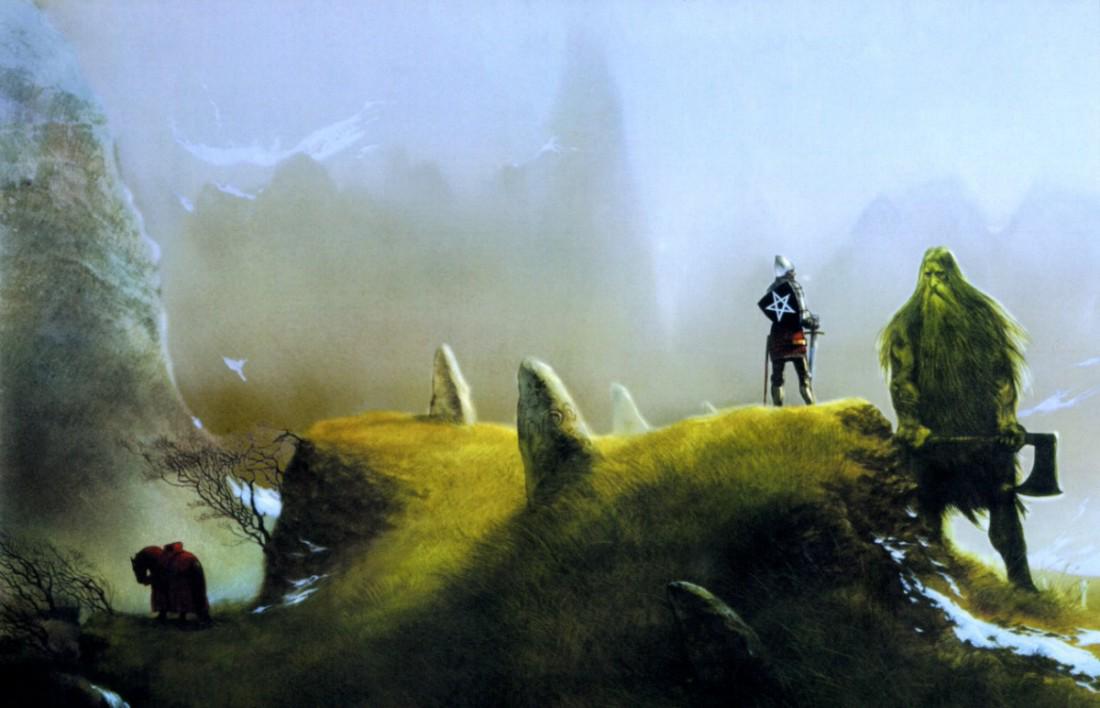
Sir Gawain is Arthur’s nephew and one of his most loyal knights. He takes extreme pride in the fact that he observes the five points of chivalry that define one in Arthur’s court. They are humility, loyalty, honesty, piety, and integrity. King Arthur’s court think that because they may have all those qualities, they are perfect. Part three is the defining moment that lets the readers know that just because Gawain follows this chivalrous code, he is far from perfect.
Sir Gawain and the Green Knight is about growth to maturity and even takes a look at reality. In the beginning of the story, King Arthur’s court has no flaw. Everybody is happy and celebrating, until the Green Knight appears out of the blue. While the court is feasting, Arthur says that he would not eat until someone tells him a story, and he does get quite a story. In the text, the Knight is introduced as “in guise all of green, the gear and the man” (151). He tells King Arthur that he wants to play a game where someone will strike him with his own axe, but he has to return the blow in a year and a day. The court's chivalry is tested when the Green Knight waits for one of Arthur’s knights to step up to take his challenge. When no one does, Arthur says that he will strike the Green Knight, until Sir Gawain volunteers to replace his king.
When none of Arthur’s people rises to take the Green Knight’s challenge, the Green Knight questions the perfection of Arthur’s court. He claims that Arthur’s followers are cowards. Gawain, however, tells Arthur that he will take a blow for his king: “Would you grant me the grace to be gone from this bench and stand by you there… if I without discourtesy might quit this board” (lines 343-345). The text describes a man who thinks that he will do the right thing at any moment in time, but he forgets that he is human.
Towards the end of part two, Gawain has found a magic castle in which the host of the castle tells him that he can stay in the castle while he goes out and hunts. He offers Gawain a covenant. The host says that whatever Gawain finds in the castle, he has to exchange for what the host finds in the woods: “And Gawain, agree now to this, whatever I win in the woods, I will give you at eve, and all you have earned, you must offer to me” (1105-1107). Gawain agrees to this, and for three days, they exchange gifts. The gifts that Gawain gives to the host are kisses that he gets from the host’s wife. On the third day, however, the host’s wife kisses Gawain three times and gives him a green girdle that she says will protect any man from death. Gawain, in turn, gives the host three kisses, but does not offer him the green girdle. The fact that Gawain does not keep his end of the bargain shows that he would rather choose to protect his own life than protect his honor.
When Gawain finally meets the Green Knight in the Green Chapel, he is extremely scared, but he puts on a brave face. He sees the Green Knight who is ready to cut Gawain’s head off. When Gawain bows down, he gets tested again, three times. The first time he flinches; the second time, he does not flinch; and the third time, the Green Knight just gives him a little scratch on his neck. The Green Knight tells Gawain that he is, in fact, the host of the Green Castle. The Green Knight explains to Gawain that even though he is supposedly “the more precious and prized to other gay knights” (2365-2366), he really is not. Gawain “lacked a little in loyalty, but the cause was not cunning, not courtship either, but that you loved your own life” (2366-2368). Gawain therefore is not perfect, which shows a reflection of King Arthur’s court also. Gawain realizes his fault, though, and asks for forgiveness; he asks the Green Knight what he can do to “gain back his good grace” (2387). To gain it back, he repents by wearing the green girdle for the rest of his life.
Perhaps the great thing in this text is that Gawain acknowledges that he is not perfect and he is willing to accept it, face reality, and attempt to change. Gawain is tested constantly throughout the text, proving his honor by upholding the comitatus with King Arthur, following the covenant shared between the lord and himself, and finally following the covenant shared between him and the Green Knight. After all this, his only flaw is that he does not want to die. Gawain is a Christian, and so, should place his faith wholly in God, but he does not do this and relies on the supposed magical girdle. When he finally returns to Arthur’s court, though, no one understands his experience. Gawain has grown up; the others have not.